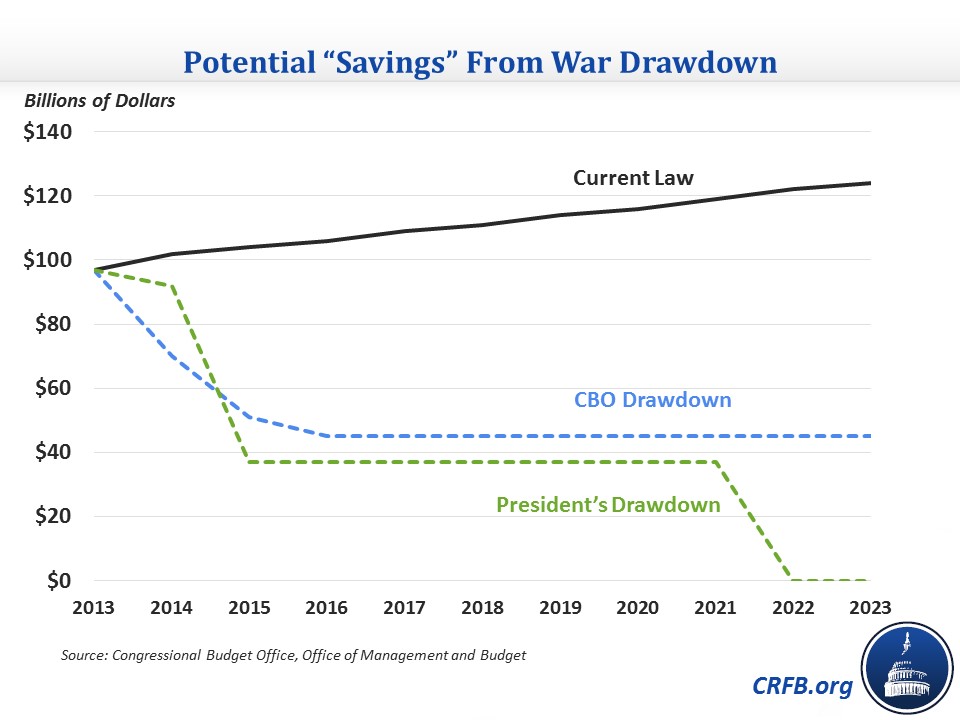Gimmicks at Their Worst: The War "Savings" Gimmick
As lawmakers look to replace the sequester with smarter deficit reduction, it may be tempting to look for easy ways out. Unfortunately in recent months and years, that has led some elected leaders to turn to the war gimmick because of the sheer size of the phony savings. Both lawmakers and outside groups have suggested using the war gimmick to "pay for" sequester repeal, a permanent "doc fix," and transportation spending. Any such efforts to use the war gimmick this fall and winter as the budget conference committee works toward a bipartisan agreement must be avoided at all costs (or actually, at no cost to the budget).
What Is the War Gimmick?
Funding for the wars in Iraq and Afghanistan is treated in its own budget category known as "overseas contingency operations," which are not subject to spending caps like the non-war defense budget and domestic discretionary spending programs are. In making its budget projections, CBO is required to assume that un-capped discretionary funding, such as war spending or emergency aid provided in response to Superstorm Sandy last year, will grow each and every year based on the rate of inflation.
However, it has been anticipated for years -- and already happening -- that the U.S. will draw down its commitments in Iraq and Afghanistan. Thus, the difference between the drawdown war spending path and the higher spending projections in CBO's current law baseline lead some people to incorrectly claim "savings" from the drawdown. All three major budgets this year -- from the House, Senate, and the President -- called for a continued drawdown of the wars, albeit with different paths. What is very worrying, however, is that some budget proposals actually count this toward their savings totals.

It could be potentially argued that the initial change in plans by the Obama Administration several years ago to speed up the drawdown of the wars, compared to existing plans at the time, could be considered as savings. However, saying that just because we're spending less on wars which were always going to be temporary and which were unpaid for in the first place somehow qualifies as savings is a bit of a leap at best. CRFB president Maya MacGuineas analogized this perfectly in a press release on the President's budget last year:
Drawing down spending on wars that were already set to wind down and that were deficit financed in the first place should not be considered savings. When you finish college, you don’t suddenly have thousands of dollars a year to spend elsewhere – in fact, you have to find a way to pay back your loans.
Why It Reflects Irresponsible Budgeting
The very concerning problem with the war gimmick is that some lawmakers try to count the phony savings toward a deficit reduction target or (more worrying) try to count it as an offset for other costs.
- Counting the war gimmick toward a deficit reduction target: The first method was particularly concerning during the Super Committee discussions, when using the war gimmick would have reduced the need for finding other legitimate savings to reach its $1.5 trillion target. But the Super Committee was unable to find any savings. Additionally, as lawmakers look to enact another $2+ trillion in savings to put the debt on a downward path as a share of the economy, in order to reach a total of $4-$5 trillion in cumulative savings, the war gimmick could detract from finding real savings. Unfortunately, the President's budget claimed $508 billion in "savings" through 2023 by reducing war spending. We let him know loud and clear that this was very irresponsible.
- Using the war gimmick to offset new tax cuts or spending: Even more worrying would be for lawmakers to use phony war savings to offset new tax cuts or spending -- thereby making future deficits and debt worse. Again, unfortunately the President's budget would set aside $167 billion of war "savings" to fund new surface transportation projects. Also, the Senate unveiled a proposal earlier in the year to replace parts of the sequester with war "savings". Again, we called it out as irresponsible. And in the past, some have called for using the war gimmick to offset the costs of replacing the Medicare SGR. This would again be a terrible gimmick, especially given the many health care options out there to offset the SGR with.
Note: Numbers are based on January 2012 baseline, so they are not up to date for the current baseline.
* * * * *
Using the war gimmick to offset other costs or to count toward deficit reduction would send a message to the American public and our investors that we are not serious about controlling the debt. In fact, it would send the message that not only are we not serious, but we are going to try to trick everyone that we're actually doing something productive on the deficit. That's the height of irresponsibility.
We encourage lawmakers to put a cap on war spending to better reflect actual policy and prevent defense budget gimmickry but not to claim savings for it.
Update: This blog has been updated to clarify how war spending is accounted for in the budget.


